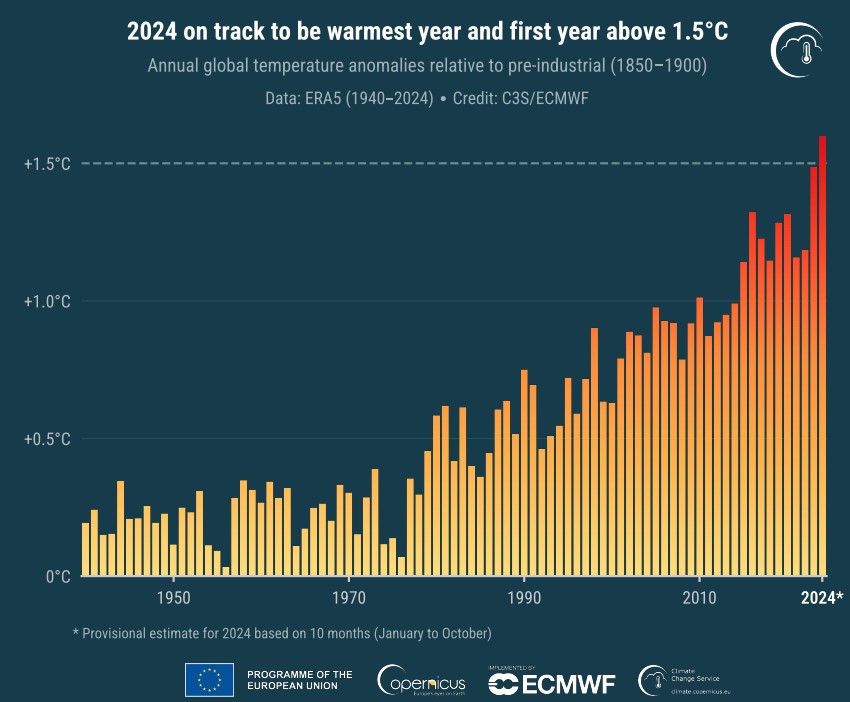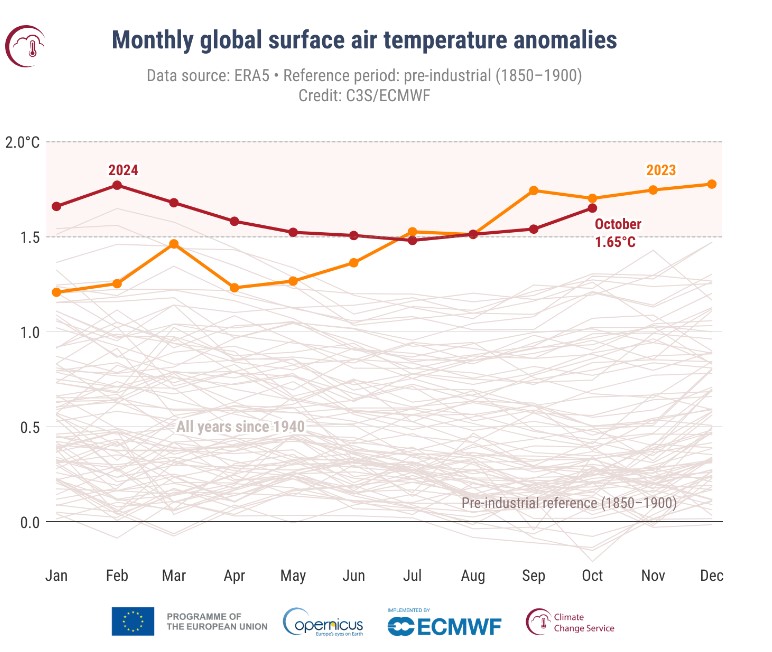2024 likely to warmest year on record, first to breach 1.5°C
2024 is all set to shatter all records, becoming hottest year ever since the pre-industrial period and also the first one to surpass 1.5°C mark ever.
By Editorial Team / Nov 8, 2024

Image Credit: Loughborough University
2024 is all set to shatter all records, becoming hottest year ever since the pre-industrial period, according to the European Union’s Copernicus Climate Change Service (C3S) and the World Meteorological Oranisation (WMO). This would be the second consecutive year to break the global annual temperature record.
According to a latest data released by C3S, the average global temperature anomaly from January to October 2024 is 0.71°C above the 1991-2020 average, marking the highest on record for this period. It is also 0.16°C warmer than the same timeframe in 2023, which is the hottest year on record.
This makes it certain that 2024 will be the warmest year on record and also the first one to surpass 1.5°C mark ever. The average temperature anomaly for the rest of 2024 would have to drop to almost zero for 2024 to not be the warmest year.

Annual global surface air temperature anomalies (°C) relative to 1850–1900 from 1940 to 2024. The estimate for 2024 is provisional and based on data from January to October. Data source: ERA5. Credit: Copernicus Climate Change Service /ECMWF.
ERA5 is the fifth generation ECMWF (European Centre for Medium-Range Weather Forecasts) atmospheric reanalysis for the global climate and weather for the past 8 decades.The estimate for 2024 is provisional and based on data from January to October. Data source: ERA5. Credit: Copernicus Climate Change Service /ECMWF.
Citing serious concern, Samantha Burgess, Deputy Director of the Copernicus Climate Change Service (C3S), said, “After 10 months of 2024 it is now virtually certain that 2024 will be the warmest year on record and the first year of more than 1.5ºC above pre-industrial levels according to the ERA5 dataset. This marks a new milestone in global temperature records and should serve as a catalyst to raise ambition for the upcoming Climate Change Conference, COP29."
The global-average temperature for the past 12 months (November 2023 – October 2024) was 0.74°C above the 1991-2020 average, and an estimated 1.62°C above the 1850-1900 pre-industrial average.
Mercury soars in October 2024 as the global-average temperature exceeds 1.5°C
October 2024 was the second-warmest October globally, after October 2023 with an average ERA5 surface air temperature of 15.25°C. This was 0.80°C above the 1991-2020 average for October.
October 2024 was 1.65°C above the average for 1850-1900, designated as the pre-industrial reference period, while October 2023 was 1.7°C during the same timeframe. October 2024 was the 15th month in a 16-month period for which the global-average surface air temperature exceeded 1.5°C above pre-industrial levels.

Monthly global surface air temperature anomalies (°C) relative to 1850–1900 from January 1940 to October 2024, plotted as time series for each year. 2024 is shown with a thick red line, 2023 with a thick orange line, and all other years with thin grey lines. Data source: ERA5. Credit: Copernicus Climate Change Service /ECMWF.
Ocean temperatures also registered rise in temperatures, despite the strong indications towards La Niña conditions, which is linked cooling down of ocean waters. The average sea surface temperature (SST) across the ocean remained unusually high over many regions. As a result, the average SSTs for October 2024 over 60°S–60°N was 20.68°C, the second-highest value on record for the month, and only 0.10°C below October 2023.
C3S had predicted similar views earlier in July that 2024 is very likely to breach the annual average temperature record. To date, 2024 has been sufficiently warm for it to be quite possible that the full year will be warmer than 2023.
Crossing the 1.5°C threshold in individual months or years does not indicate that that the Paris Agreement's average global temperature target of 1.5°C has been breached. However, repeated instances have brought the world quite close to the number. The warmer atmosphere and oceans have raised atmospheric moisture levels, a trend clearly reflected in the extreme weather events occurring worldwide.
Climate Change 2024 Warmest year Global Warming Paris Agreement

